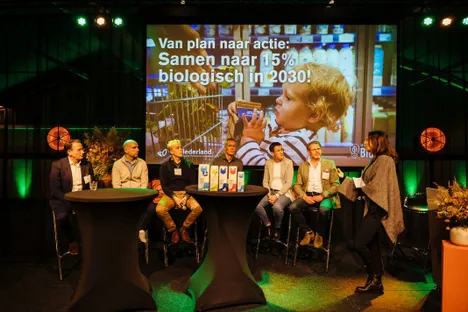Despite consumers spending 36% more on organic last year, the question is whether the steady growth of the organic sector is enough to achieve the ambition of 15% by 2030 from Minister Adema's Action Plan. The number of households that occasionally buy organic rose to 96.4% last year (GfK, 2023). Despite supermarkets accounting for 73% of organic sales, the share of organic in supermarkets remains stuck at 3%. In a panel discussion at the Bio Fair, the four chain parties Albert Heijn, Plus, Odin and de Smaakspecialist shared their views on achieving more organic sales.

Seated from left to right: Eric Harmsen (GfK), Sebastiaan Aalst (Food Cabinet), Jasper de Jong (Plus), Martijn Versteegh (Albert Heijn), Merle Koomans van den Dries (Odin) and Pieter Dirven (De Smaakspecialist). On the far right, discussion leader Marjolein Keuning.
Total organic sales grew 36% in 2022. Last year, organic products ended up in our shopping basket an average of 33 times; in 2020 this was 29 times. Average spending per organic purchase also increased, from 4.50 euros to 5.30 euros, more than inflation (GfK, 2022). Plus wants to double its organic sales of almost 4% in three years and Albert Heijn also wants organic to grow substantially.
The study also included the impact of the crisis on households: 68.4% of organic sales come from groups not (yet) affected by the crisis. Organic is mainly bought by households with children with an above-average income, two-income earners, breadwinners and well-off pensioners. Together, they account for 60% of total sales.
"Consumers do not immediately do all their shopping organically, it often starts with one product. You shouldn't want to push or force this on them, that will put them off and they won't come back. Just like farmers who switch over the course of two years, consumers also have to switch slowly," says Merle Koomans van den Dries of Odin, the organic cooperative celebrating its 40th anniversary.
"Consumers who consider organic important have an organic sales share that is five times higher," said Eric Harmsen of GfK. "Communicating the importance of organic seems to be the key to further growth, from unconscious to conscious. If we want to grow to 15%, organic has to become part of the routine, so that it is already organic when you pick it up."
HAK chose this drastic approach, announcing at the Biobeurs that they want to switch completely to organic by 2027. But Plus also opted earlier to offer its own-brand dairy range organic as standard, at the same price: "By switching some 17 million litres of milk to organic in one go every year, we are making a real impact. We did that before with fair trade bananas and our chocolate, and we will continue to do so with new choices," said Jasper de Jong of Plus.
Albert Heijn has the largest organic range with 1850 organic products and an organic share of around 4%: "We want to make better food accessible to everyone. This is why we have 1850 organic products in our range. Taking responsibility also means giving the 'better choice' a better place," said Martijn Versteegh, strategic director of Beter Eten (Better Food) at Albert Heijn.
"Because things have to be different and can be different. You can make a difference with every bite," said Pieter Dirven of the Taste Specialist. As the GfK figures show: most are able to continue buying organic. So fears that sales are falling due to inflation are unfounded. The bulk will continue to choose organic; reason enough to offer even more organic.
"The question is whether we should keep heading for only communication about the positive impact of organic. You should also show the damage you do by buying other products. Only then will you have a fair picture. Why aren't we transparent about that? Then that bit extra you might pay more for organic is suddenly not so bad," Koomans van den Dries of Odin believes.
The parties agree on one thing: "Before, we were still pointing fingers at each other. Now we have moved on and agree that it is also our responsibility."
